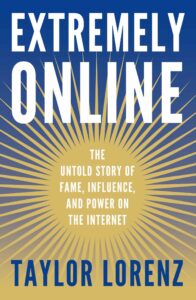Taylor Lorenz Debut ‘Extremely Online’ Documents the Rollercoaster Rise of Social Media

Taylor Lorenz. Photo by Brian Treitler.
With our eyes focused on the sad horizons of survival we tend to discount, or if callous, despise, moments free of obligations – and frequently subject them to anxiety over the week to come. Even in the sweet seconds after a home team win. A quick transition: sometimes, stepping into the Internet, we lose track of time and begin to create an abundance, imagine an epic, and rev our wheels wistfully.
That’s a good thing. But it’s brutal out there.
In her debut book, Extremely Online, Taylor Lorenz cleaves through the history of social media without sentimentality but with a natural and necessary empathy. The author catalogues this history without derision or praise. Here, Lorenz has solidified her role as the scribe of the Internet.
While Extremely Online is not an encyclopedia, Lorenz takes the reader through the shaping of the Internet as we know it with fantastic aplomb, encyclopedic knowledge of the subject, and in a breezy, fewer-than-300 pages, does not waste an inch of space or a microgram of ink. Immediately gripping, Extremely Online pulses from page to page – each piece of the story moving the reader forward through the text with the anticipation we once felt as the long-gone familiar bleeps and crackles of dial-up modems blared and sent us hands-first into the Internet.

Extremely Online by Taylor Lorenz
Without giving too much away, the introduction is clear. This story is about “capitalism” with a focus on the “users who revolutionized entirely new approaches to work, entertainment, fame, and ambition in the twenty-first century.”
Users, of course, in the social media ecosystem, are both the product and the purchaser. And, in narratively-driven case studies, Extremely Online magnifies underbellies teeming with gossip, excitement, motherhood, surprises, unexpected consequences, the creation of “new celebrity,” and money – lots and lots of money.
Lorenz is adept at keeping the reader’s attention as she dashes off and through a litany of in-crowd cricket-like deals, deals, deals, consistently increasing numbers of digits next to dollar signs, and an ever-expanding array of acronyms for new media companies that stylize themselves as “Multi Channel Networks.” These MCNs, Lorenz explains in Extremely Online, are the hack, spit, and glue that hold and put together a great deal of content that consumers see on their devices.
Sometimes originating from creators’ own efforts to promote their content, sometimes a bit more neck-tied from the get go, MCNs are corporatized entities that exist to emulate the feel and reach of cable TV behemoths who spin out online experiences that, on the surface, look different but are huddled tightly under the same aegis. And, aside from sneakily real-seeming public incidents and private reactions that are almost always staged, MCNs apparently exist in order to desperately and lucratively turn social media stars into purveyors of old tricks like the never subtle product placement, into self-aggrandizing carnival barkers selling rides on their egos, and into traditional Reaganite pitch people starring in the American equivalent of a well-respected short: a national 30-second spot.
***
Instagram’s sticky pretentiousness offers a cutting, almost heroic-seeming figure against the sea of platforms instantly aiming to be as effete as possible.
Lorenz writes that Kevin Systrom was “strongly against” advertisements on the app – unambiguously against them; at least for awhile – expressing something akin to idealism about art and community. The original vision of the app was aesthetics against all else; a place where users would “see their world anew.” And, we don’t venture too far to imagine the hope went: in a beautifully filtered light.
Believing the appearance and user experience should be guided by photographers “who had enjoyed practicing their craft” and who “wanted to share that joy,” the founders aimed for a palace style. This style, for some time, was tightly controlled by directly working with power users. Later on, the style was set in a more organic-seeming fashion by using the namesake account to serve as an obvious example.
Instagram tried hard, so hard, to keep advertising away from their shiny, good-vibes-only platform, and, failing that, to stealthily skirt exchanges through their own ether as it filled and capsized with unavoidable filthy lucre.
Clarendon, Valencia, Lo-fi; Nashville, Rio De Janeiro, Paris, Los Angeles, even Nermal’s frequent forced layover care of the never-circumspect U.S. Postal Service. The bright and vibrant as the beautiful and damned. The filters couldn’t keep out the brands the company pretended they could always never want.
But the company, tethered to VC concerns from the beginning, was doggy-paddling upstream. Systrom himself oversaw the first formal advertisement. Where the LUTs and the loot might seem to disagree, just look to society’s actual values.
One instructive meta-narrative in Extremely Online comes by way of regulators under the Obama administration. In March 2016, the Federal Trade Commission sent the stealth ad system of Instagram into a brief panic. And, in true Democratic Party fashion, the result just made capital’s influence more effective. It would be trite, cliché, and incorrect to assume haplessness on their part.
By going after one advertiser who failed to disclose some influencer payments, the ecosystem shifted. Disclosures weren’t just standard fare after this episode, they quickly became the lifeblood of triumphalism for the aspiring free-marketeer.
“The FTC could not have done creators a bigger service,” Lorenz writes.
Advertisers either.
Almost immediately, advertisements were a new form of social esteem within the network – and soon this attitude spread. Eventually, the posting public would begin to spend their own money on products to try and fool their followers into thinking their purchases were sponsored. It’s a sordid, telling trend.
In the end, Instagram’s efforts might look like intellectual puffery or well-timed artistic snobbery intended to exact the biggest eventual asking price. Maybe. But really the riptides and undercurrents all make shore more or less the same way. And all the posturing can read as prelude – at least in a cultural history.
***
As with all the old, tedious, and correct foreseers of youth cultures focused on how to afford the next best model of the InSinkErator, the banality of observation drips like so many simple reflex tear coating the eyes just enough to let them roll: commodification in media ultimately saps a lot of the joy away. Well, yeah. On a long enough timeline, even Eddie Vedder‘s estate will be selling Hondas.
But where Raoul Vaneigem went a bit off-base about the cycle of stars amassing popularity and being discredited to the point we abandon the concept of stars, Extremely Online gets to the heart of the matter. There’s an ever-increasing bumper crop of ingenues the world can now pseudo-anonymously subject to campaigns of hate, pump dry and bankrupt, or drive into exile and suicide.
Here there’s an easy test: Do we allow our empathy to be ground down by forces arrayed to do exactly that? Do we turn less-than-sporting and agree to spike our beloved entertainers and then tramp the dirt down on their graves?
A second round of levels: Do we have the capacity to care? A handful of the social stars, but not all, of them, have thrived to multimillionaire status, after all. Often, the characters in Extremely Online are even less sympathetic: distressed founders upset their apps are not being used to the purposes they envisioned before getting bought out by larger corporations that helped them become multimillionaires and billionaires; distressed content creators upset they cannot monetize their often misogynistic, racist, homophobic jokes. But a lot of the people we meet in the book begin their social media journeys as literal kids foisted into a toxic potlatch.
One of Lorenz’ characters takes time off from the Internet to deal with his IRL synesthesia – in a metaphorical understanding of the condition, the Internet might be conceived as an outwardly vibrant, pulsing thing, a beckoning cave of cool that glitters and dazzles and offers all-but free rides to those who can reach and grab hold. Then, all too often, for the creators and influencers who assigned their entire self-image and mental health to such a place, when you scratch the surface, it’s more like a Bowsky-Calpini-drawn neon trap; a sparkling swimming pool that beckons in the night, daring head-first dives, not an inch of water left to swim.
Lorenz is an epic storyteller who burns iridescent in the way her historian-like accumulation of facts help the reader to see bigger trends, and not simply as animating and powerful movements, but why we should care about them.
Many of the stories are sad. And we no longer sustain the once-popular illusion of Internet exceptionalism. While online is, perforce a space with easy access to effectively limitless possibility, the people there are real. And real people need and do real things when hurt or at the end of their ability to keep running for monthly necessities. One underlying message of Extremely Online is that humans can rise above the money and the power that treats us like so many cucaracha-hamster hybrids ready to sprint and scramble for pellets or be squished the first time advertisers get the vapors. Lorenz invites a bird’s-eye-view of the constant churn our Internet has become since media became social. There’s a lot to see.
In the pre-social Internet, another imaginative storyteller implored to rapt audiences of subculturists pirating his messages – as he agreed audiences should do – on Napster and Limewire, or paying 10 bucks at all-ages venues, to bypass the corporate gatekeepers and other powers that have always been: “Don’t hate the media, become the media.” Well, now we have no choice but to do both.
The lessons are clear enough. With or without empathy for beleaguered social media content makers, we are reminded by the author: “we must all be creators” – because we are – “influencing the world we inhabit.”
Another lesson lurks: the folly of ideals in a market-valorizing space.
There’s no defeat in admitting the folly of tsk-tsking the manner in which creators and influencers navigate a fundamentally abusive society premised on an economized existence; the folly of trying to carve out and sustain superior attitudes about consumption and selling so as to better mow the lawn of our survival-based system where “the rage to accumulate, to be the best, to possess even more” is intended to slowly starve out our stubborn desires to create and influence environments; the folly of always trying to rise above boredom by showing how interesting and novel and interested we are. We can also see that the folly of a life spent scornful of living – as it is – isn’t much of a life at all.
***
For the terminally online and even those who aim to avoid it, Big Tech – a loose affiliation of millionaires and billionaires and baby-brained engineers – has a lease on our privacy, content, and attention; often harvesting the tiberium of what constitutes, at the very least, the digital reflection of our living, human souls.
Lorenz shows us that, aside from the occasional application of cinematography and editing, the constantly re-spawning Internet new guards are typically not avant in any real or really interesting sense: typically, instead, just a diminished reflection of ever-diminishing Western culture.
Still, for all the Zyklon B polluting the networks, we know the Internet is one of the only sources of fresh air in a country where Eagles cover bands – almost more tolerable than real bile – reign supreme every night on Bourbon Street, where swathes of IP are recycled into splintered and synergistic iterations upon iterations even as artists’ oeuvres come under the control of ever-fewer corporations.
In Extremely Online, there’s a tension: the stagnant-but-still-twisting reality of capital and its tendency to sell us for parts and sink its teeth into us – savoring the taste and replacing love – vs. the eternally untapped and endless hopefulness of human power in everyday life.
So, there’s a challenge: getting past the clouds of propaganda extolling triumphalism and competitiveness, speaking and hearing beyond the cultural vocabularies that stake out and therefore confine (and prescribe and therefore proscribe; that give names and therefore define) thought and its logic itself, ignoring completely the disfigured memes, in the original and contemporary sense, that bound the realms of possibility and turn truly innovative and good ideas into false bridges toward utopias.
There is a miasmic haze of this stuff pushed out by cliques of petit vampires angling for C-suite status and junior partnership amongst the dead. Stuff that works to create an overwhelming sense of confusion so that we latch onto the comfortable, the knowable, the spent-and-unspent all-accumulated knowledge (and more) before us and, as a Belgian intent on truly living mused, encourage us to “grab hold of dead things” and “die within them as they take hold of us.”
Lorenz reminds us there are big sights yet to see. Real frontiers out there. Minds worth protecting. Art worth staring at until we’re shook and shaken out of our Stendahl Syndrome by a well-meaning friend and told we’re being weird.
Under these decidedly drab and dire-seeming circumstances, it’s easy to forget the Rooneyian question we’re all called to answer under the flickering fluorescent lights of late capital. But it can be a beautiful world, full of love, we just have to look. And the looking, the wandering, the aimless dérive through un-monetized content – highbrow; lowbrow; no-brow; and in between – is what makes it worthwhile. The searching sustains the luster. Even on the Internet.
This is an opinion piece. The views expressed in this article are those of just the author.




